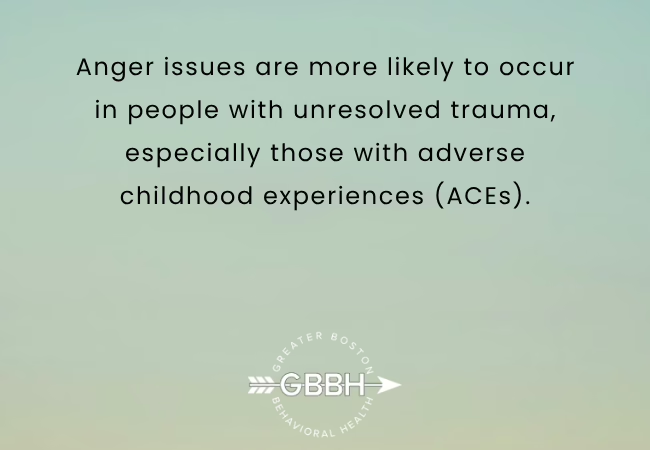Anger is a natural emotion—but when unmanaged, it can escalate into verbal abuse, physical altercations, strained relationships, and legal consequences. At Greater Boston Behavioral Health, our anger management therapy in Massachusetts is designed not just to calm emotions, but to transform how individuals relate to stress, conflict, and their internal reactions.
Whether you’re in a Partial Hospitalization Program in Massachusetts or an Intensive Outpatient Program, the techniques below form the core of effective anger management care.
1. Cognitive Behavioral Therapy (CBT)
CBT is a foundational approach in anger management. It helps individuals identify distorted thought patterns that trigger anger and replace them with healthier perspectives. Core CBT techniques include:
- Challenging automatic negative thoughts
- Cognitive restructuring (reframing)
- Problem-solving training
- Behavior tracking (anger diaries)
Clients learn to pause, assess, and choose a more productive reaction.
2. Mindfulness and Relaxation Training
Anger often activates the body’s fight-or-flight response, causing muscle tension, rapid heart rate, and shallow breathing. Mindfulness techniques help clients:
- Recognize physical signs of anger early
- Develop nonjudgmental awareness of emotions
- Use deep breathing, body scans, and progressive muscle relaxation to reset
This approach is especially effective in Mental Therapy Programs in Massachusetts that emphasize emotional regulation and trauma-informed care.
3. Assertiveness Training
Many clients express anger due to passive communication patterns or suppressed needs. Assertiveness training teaches:
- How to express needs clearly without aggression
- The difference between assertive vs. aggressive tone and body language
- Techniques like “I” statements and boundary setting
This helps individuals stand up for themselves without provoking conflict—a key skill in both residential treatment and outpatient settings.
4. Trigger Identification and Anger Mapping
Understanding what sets off your anger is crucial. Anger mapping involves:
- Listing common triggers (e.g., disrespect, feeling ignored)
- Recognizing physical cues (tight jaw, rapid speech)
- Identifying emotional precursors (shame, fear, exhaustion)
Once these patterns are mapped, therapists can tailor interventions that defuse escalation before it peaks.
5. Group Therapy for Shared Learning and Feedback
In many of our Mental Health Programs in Massachusetts, group therapy creates a powerful space for clients to:
- Share personal challenges and coping strategies
- Practice healthy dialogue and boundary-setting
- Receive constructive feedback in real-time
Being in a group setting also normalizes emotional struggles and encourages mutual accountability—especially helpful in Intensive Outpatient Programs.
6. Role-Playing and Conflict Simulation
Therapists often use role-play to rehearse real-life conflict scenarios. This allows clients to:
- Practice using calming techniques under pressure
- Experiment with assertiveness strategies
- Receive coaching on body language and tone
This experiential technique prepares individuals to handle future conflicts with more confidence and less reactivity.
7. Anger Journaling and Reflection Exercises
Keeping an anger journal helps clients:
- Track the frequency, duration, and triggers of anger episodes
- Reflect on consequences and how they wish they’d responded
- Gain insight into recurring interpersonal dynamics
Journaling is particularly helpful for individuals in a residential treatment program in Massachusetts, where daily structure allows time for self-reflection.
8. Boundary-Setting Techniques
Many individuals with chronic anger have poor boundaries—either letting others walk over them or overreacting to minor threats. Therapy teaches:
- When and how to say “no”
- How to enforce limits without guilt
- Understanding the difference between control and respect
Effective boundaries are essential for mental wellness and long-term recovery.
9. Holistic Modalities That Enhance Emotional Balance
Our Mental Health Treatment Center in Massachusetts complements clinical therapy with holistic practices like:
- Yoga and tai chi (for somatic awareness)
- Art therapy (for non-verbal expression)
- Music therapy (to tap into emotional states safely)
- Nutritional counseling (to support mood regulation)
These methods promote emotional grounding and nervous system balance—especially useful for clients with trauma histories.
10. Anger Management in the Workplace and Relationships
Therapists also tailor strategies for clients struggling with anger at work or home, including:
- Emotional regulation in meetings or confrontations
- Managing stress to reduce reactivity
- Communication scripts for difficult conversations
- Self-care routines to reduce emotional burnout
Skills like these are frequently built during PHP or IOP sessions when real-world stressors remain active during treatment.
11. Involving Family or Couples When Appropriate
Unresolved anger often damages relationships. As part of comprehensive care, Greater Boston Behavioral Health may incorporate:
- Family therapy to repair and rebuild trust
- Couples counseling to address communication breakdowns
- Psychoeducation for loved ones on anger, trauma, and triggers
Our goal is to help you not only manage anger—but also heal the damage it may have caused.
12. The Science Behind Anger: Understanding the Brain’s Response
To effectively manage anger, it helps to understand what’s happening neurologically:
-
Amygdala activation: Triggers the “fight-or-flight” response
-
Prefrontal cortex inhibition: Reduced decision-making and impulse control during outbursts
-
Hormonal surges: Elevated cortisol and adrenaline increase irritability and aggression
Anger management therapy in Massachusetts focuses on strengthening the brain’s executive functions so individuals can slow down, self-regulate, and respond rationally—not emotionally.
13. Legal and Court-Mandated Anger Management: What to Expect
Many clients are referred to anger management through the legal system for:
-
Domestic disputes
-
Workplace altercations
-
Road rage incidents
-
Custody-related conflicts
Our mental health treatment center in Massachusetts offers structured, court-accepted anger management programs that provide documentation, progress tracking, and long-term relapse prevention.
14. Measuring Progress: How Success in Anger Management Is Tracked
We use both clinical assessments and personal feedback to monitor progress, including:
-
Self-reported anger intensity (0–10 scales)
-
Frequency of outbursts over time
-
Improved communication in relationships
-
Ability to implement coping techniques under stress
-
Completion of therapy milestones (journaling, role-play, CBT modules)
Clients in Partial Hospitalization Programs or Intensive Outpatient Programs in Massachusetts often set personalized goals and review them weekly with a clinician.
15. Integrating Anger Management with Broader Mental Health Treatment
Anger is often a symptom of underlying issues, not a stand-alone problem. Common co-occurring diagnoses include:
-
Depression (irritability, passive anger)
-
Anxiety (fear-based anger, reactivity)
-
PTSD (hypervigilance, rage responses)
-
Substance use disorders (disinhibited aggression)
That’s why our Mental Health Programs in Massachusetts offer comprehensive dual-diagnosis care that treats the full emotional spectrum—not just the visible behavior.
Why Choose Greater Boston Behavioral Health?
At Greater Boston Behavioral Health, we offer:
- Personalized anger management plans
- Structured support through PHP, IOP, and inpatient programs
- Trauma-informed care and co-occurring disorder treatment
- Licensed therapists with expertise in emotional regulation
- A safe, stigma-free environment for growth and change
Whether you’re dealing with anger from trauma, stress, or a mental health condition, we’re here to help you take back control—with compassion and clinically proven tools.
Conclusion
Anger doesn’t have to control you. With the right tools and guidance, it can become a catalyst for growth, not destruction. Whether you’re struggling with everyday irritability or explosive outbursts, anger management therapy offers a path to clarity, calm, and confidence.
At Greater Boston Behavioral Health, we combine proven techniques like CBT, mindfulness, assertiveness training, and group support within our Partial Hospitalization Programs (PHPs) and Intensive Outpatient Programs (IOPs). Our approach empowers you to recognize your triggers, reshape your responses, and rebuild your relationships—all within a compassionate, evidence-based framework. Take the first step toward emotional balance today. Call us at 888.278.0716 to learn more about our Anger Management Therapy in Massachusetts. Because managing anger isn’t about suppressing it—it’s about learning to own it, express it, and let it go—on your terms
FAQ on Anger Management Therapy in Massachusetts
What is the most effective therapy for anger issues?
Cognitive Behavioral Therapy (CBT) is widely regarded as one of the most effective methods for managing anger. It helps individuals identify and change thought patterns that fuel aggression.
How long does anger management therapy usually take?
Duration depends on individual needs. Some clients may benefit from 8–12 sessions, while others in PHP or IOP programs may engage in longer, structured treatment.
Is anger management covered in a Partial Hospitalization Program?
Yes. Our Partial Hospitalization Program in Massachusetts includes anger management modules as part of comprehensive emotional regulation therapy.
Can anger management help with anxiety or depression?
Absolutely. Many people with underlying anxiety or depression experience anger as a secondary symptom. Anger management can reduce emotional overwhelm and improve mood.
Is group therapy or individual therapy better for anger issues?
Both are beneficial. Individual therapy focuses on personalized strategies, while group therapy offers peer support and practical communication skills. Our programs often include both.


